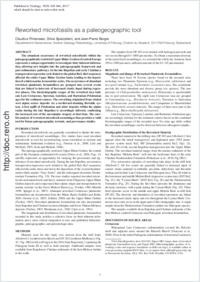Reworked microfossils as a paleogeographic tool
- Pirkenseer, Claudius Department of Geosciences, Section Geology-Paleontology, University of Fribourg, Switzerland
- Spezzaferri, Silvia Department of Geosciences, Section Geology-Paleontology, University of Fribourg, Switzerland
- Berger, Jean-Pierre Department of Geosciences, Section Geology-Paleontology, University of Fribourg, Switzerland
-
08.04.2011
Published in:
- Geology. - 2011, vol. 39, no. 9, p. 843-846
English
The abundant occurrence of reworked microfossils within the paleogeographically restricted Upper Rhine Graben of central Europe represents a unique opportunity to investigate their inherent information, allowing new insights into the paleogeographic framework and past sedimentary pathways. In the late Rupelian and early Chattian a transgression-regression cycle linked to the global Ru2–Ru3 sequences affected the entire Upper Rhine Graben basin, leading to the deposition of a thick marine to lacustrine series. The occurrences of abundant reworked planktonic foraminifera are grouped into several events that are linked to intervals of increased clastic input during regressive phases. The biostratigraphic ranges of the reworked taxa indicate Late Cretaceous, Ypresian, Lutetian, and Bartonian–Priabonian ages for the sediment sources. The reworking originated from related west alpine source deposits via a northward-draining fluviatile system. A fast uplift of Priabonian and older deposits within the alpine realm during the late Rupelian is accordingly inferred, confirming the increased rate of the mesoalpine orogeny at that time. The careful analysis of reworked microfossil assemblages thus provides a valid tool for future paleogeographic, tectonic, and provenance studies.
- Faculty
- Faculté des sciences et de médecine
- Department
- Département de Géosciences
- Language
-
- English
- Classification
- Palaeontology
- License
-
License undefined
- Identifiers
-
- RERO DOC 27981
- DOI 10.1130/G32049.1
- Persistent URL
- https://folia.unifr.ch/unifr/documents/302065
Statistics
Document views: 140
File downloads:
- pdf: 307
